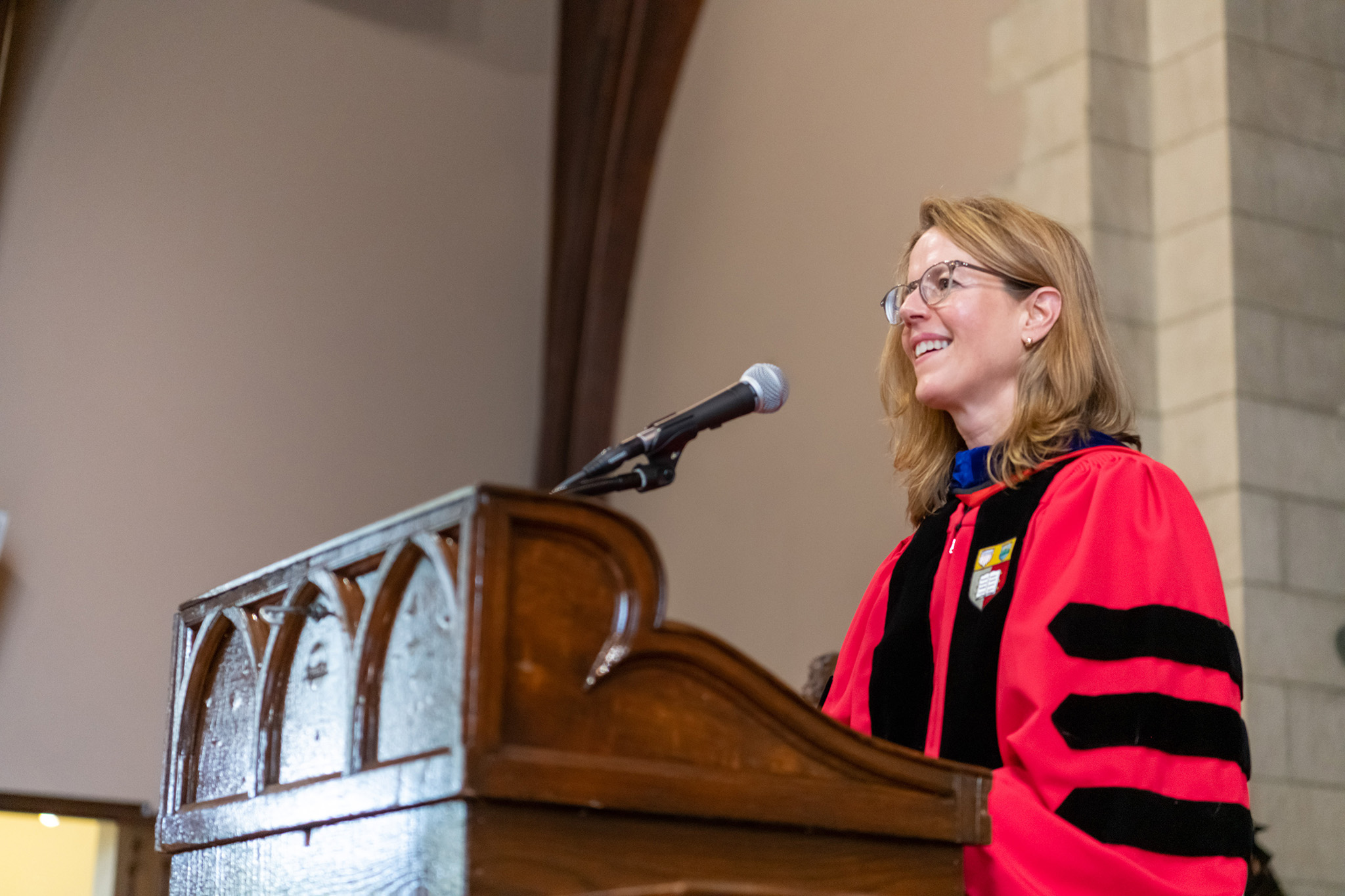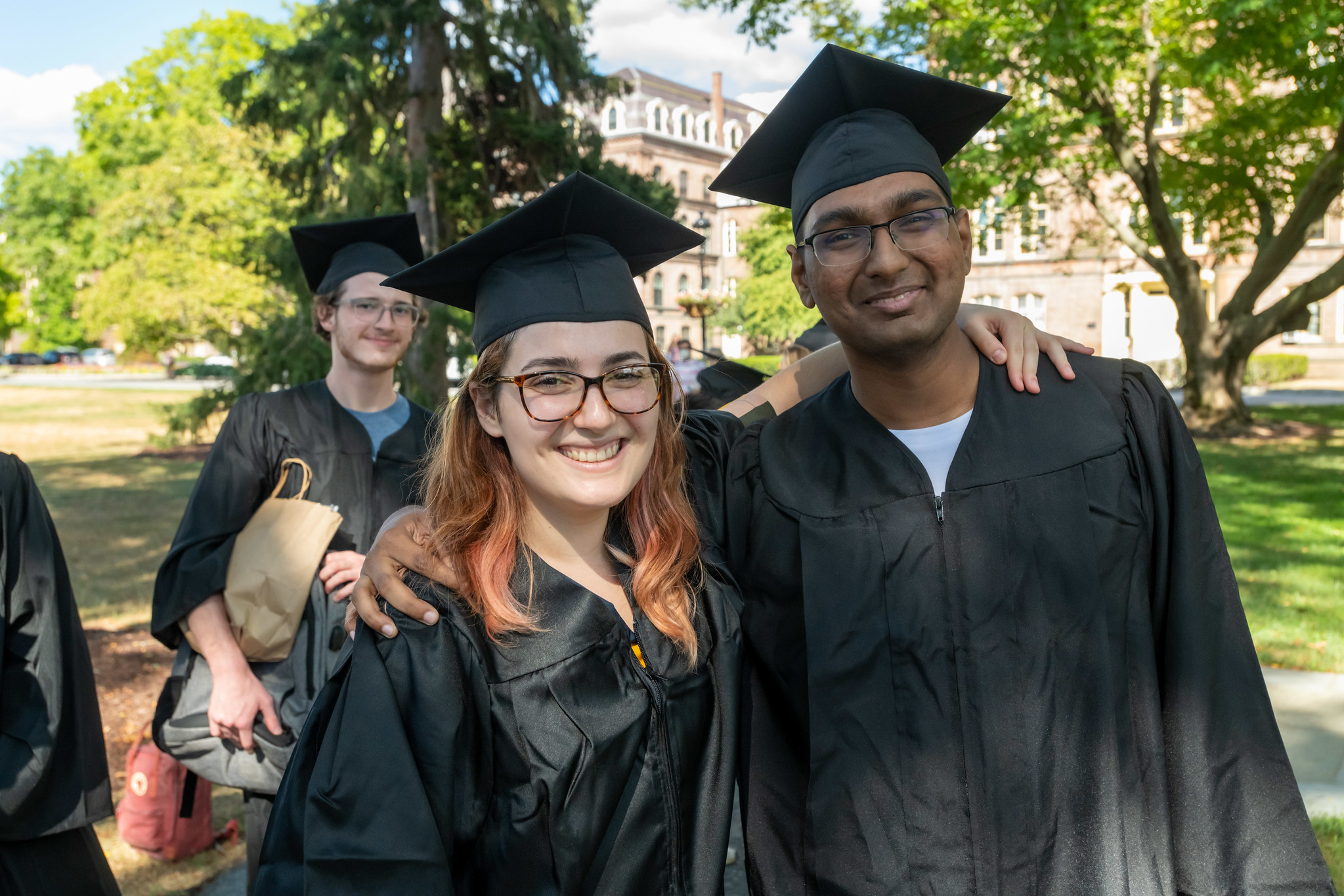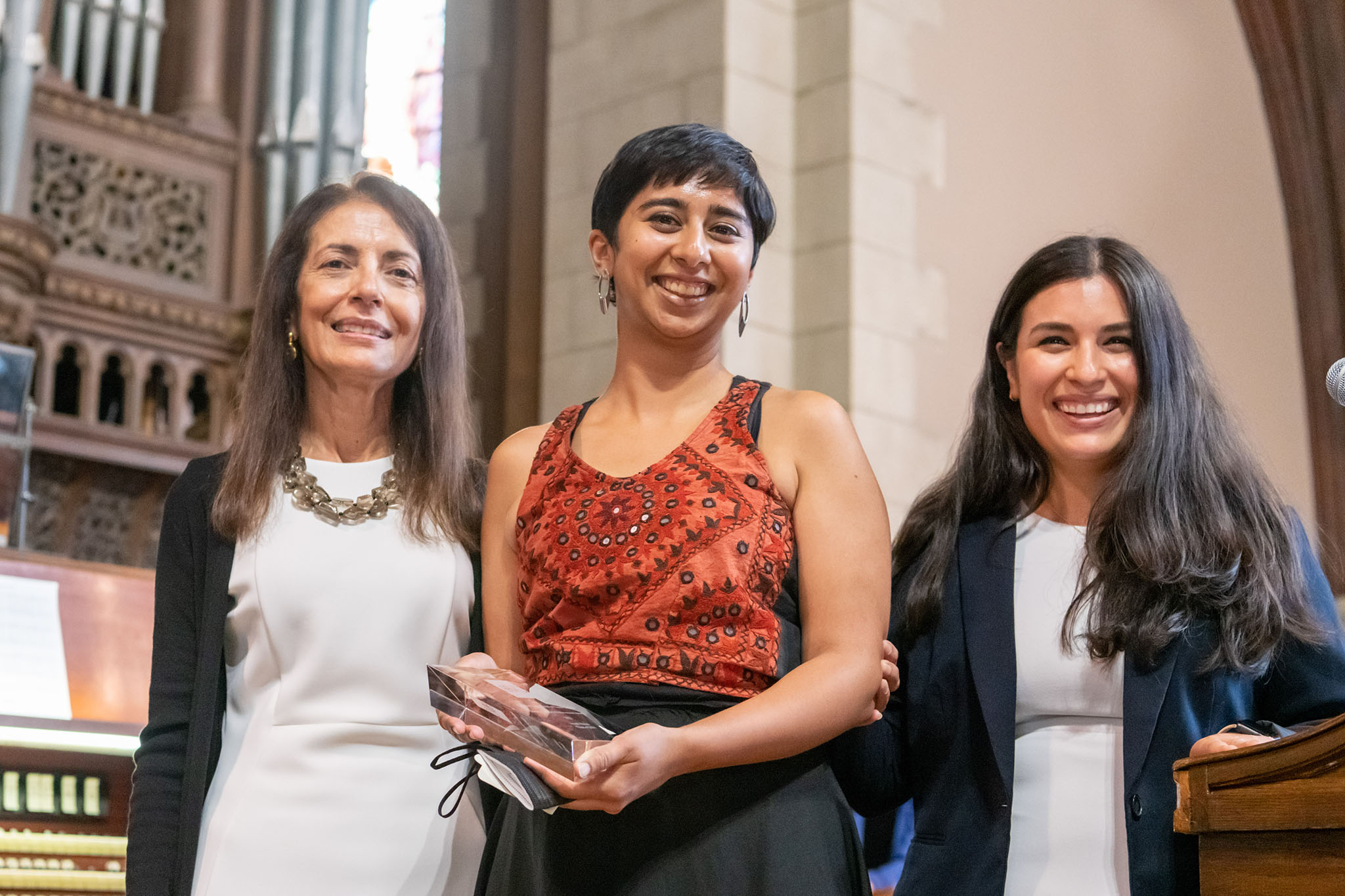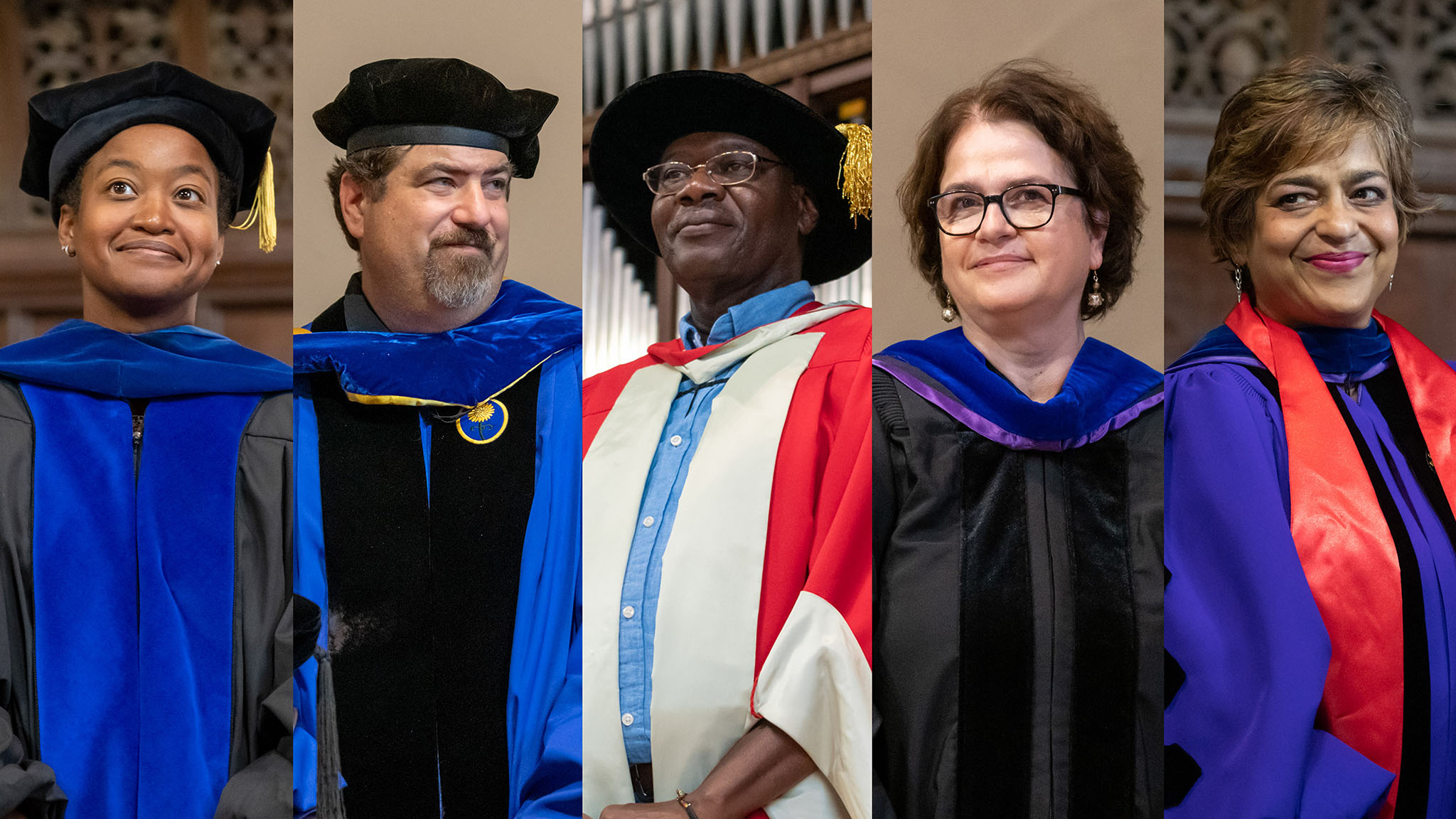Convocation 2022
Convocation, Vassar’s annual ritual marking the start of the new academic year, was back in its traditional venue—the Chapel—filled to near-capacity on a warm, sunny day August 31, following a two-year COVID-driven hiatus. And as she welcomed students, faculty, administrators, and staff back to the campus, President Elizabeth H. Bradley said recent events had underscored the importance of collaboration. “This work of coming together as a learning community is not easy, particularly for those of us raised in the United States where so many have valued individualism and freedom over mutual interdependence,” President Bradley told the more than 1,200 in attendance. “Yet, as the pandemic, persistent racial and global inequities, and the climate emergency have made tragically clear, our futures are inextricably bound to each other. We are in this together.”

Dean of the College Carlos Alamo-Pastrana formally welcomed the Class of 2026 and saluted the Class of 2023 for making Vassar a better place since they arrived three years ago. Dean Alamo-Pastrana recalled the words of novelist and civil rights champion James Baldwin, who called on his fellow citizens to tell “a different and better story” about the history of the nation. “All institutions are imperfect, and Vassar is no exception,” he said. “Our seniors have worked hard while they have been here to tell a different and better story, and their work has been a model for others to follow.”
Vassar Student Association President Julián Aguilar ’23 said starting his final year at Vassar had prompted him to appreciate his college experiences— both good and challenging. He urged the first-year students to cherish every Vassar moment. “I am not the same person I was three years ago,” Aguilar said. “I’ve been lucky to have people stick by me in my lows and help me celebrate my highs. As I contemplate my last days here, I think what I experienced applies to us all. So try new things. Give others a break. Raise your hand in class.”

Professor of History Nancy Bisaha then offered the students a broader perspective on the value of education, telling the story of her life’s journey as the granddaughter of immigrants and the daughter of working-class parents who encouraged her and her siblings to become among the first in the family to go to college. “People often ask me what made me want to get a PhD in medieval history in the same way you might ask someone why they decided to become a giraffe,” Bisaha said.
She said her mother had graduated near the top of her high school class, but never gave much thought to going to college herself—yet told her and her siblings from a young age that they were going. “She wasn’t sure how we’d pay for it, but she was confident we’d figure it out,” Bisaha said. “We were not going to miss the opportunity that she did.”
Bisaha said her love of history stemmed from her desire to learn more about her own family, as well as the family histories of her classmates. “I loved the diverse traditions they practiced from different parts of Europe, Latin America and occasionally Africa and Asia,” she said, adding that she came to understand that much of the history she had learned in school was “pretty whitewashed. We didn’t get a complicated view of the past. Columbus was a hero, end of story. Indigenous people were depicted in a flat, largely unsympathetic fashion. Washington and Jefferson’s slaves went unmentioned.”
Her high school English classes did enable her to gain an appreciation of some medieval and Renaissance writers, and her curiosity was further piqued by a paperback titled Portable Medieval Reader, translated and edited by two Vassar historians, Mary McLaughlin and James Bruce Ross.

Bisaha said her time as an undergraduate at Rutgers College was quite different from those who studied on a campus like Vassar’s. “None of us lived on campus; we were part of that exotic species known as ‘commuters,’ who lived at home with their parents.
“Inconceivable, isn’t it?” she said as she gazed at the students in the Chapel, “except that many of you did exactly that in 2020! But what my commuter friends and I lost in partying and uncomfortable dorm life we gained in camaraderie and lack of student loans.”
Bisaha said she was pleased that so many first-generation and lower-income students are now able to attend Vassar “due to the support and generosity of our alums and other donors. If you did take out loans or work a job to be here, or you’re first-gen, be proud of yourself every day. You are brave and wonderful.”
Bisaha said arriving on the Cornell University campus for her graduate work was somewhat intimidating at first. “I felt like a giant hick next to Ivy Leaguers and children of diplomats, and generally out of my depth,” she said. “But you don’t have to arrive as a star at grad school or law school or med school. It’s a marathon of endurance, daily commitment and slow progress, but I found I was able to outlast and outperform half of my incoming grad students who left to pursue other paths. I’m not saying I was the best or the smartest, but I stayed the course. Sometimes you achieve the most by simply refusing to quit.”

Addressing the students in the crowd directly, Bisaha said the Vassar mantra ‘Go to the source’ is the basis of critical thinking. “Question the information you receive, make sure it’s trustworthy or that you’re clear about its biases and shortcomings,” she said.
Bisaha said critical thinking is not simply beneficial as an academic exercise. “That’s another great gift of the humanities,” she said. “In our quest to achieve our dreams or save the world, they constantly ground us. We’ve been through a crazy six or so years with intense political polarization, the stripping of civil rights and choice for women, and of course, COVID. The humanities, and especially Medieval Studies may not on their own offer all the answers, but reading about reactions to the Sack of Rome in 410 or the rise in authoritarian rule in the Church and state, or the Black Plague of 1348, or the stories of single medieval working mothers make us somehow feel less alone,” she said. “There’s comfort in seeing yourself in another person’s life story or a treatise or a work of art or literature.”
Bisaha closed by offering some words of advice to the sophomores and juniors in the Chapel: “You’ve had it tough, as we all know, but you’ve already won half the battle because you’re still here despite the trials of finishing high school on a computer screen and starting college six feet apart and maybe in quarantine. Sometimes you achieve the most by simply refusing to quit.
“And second, to all students here,” Bisaha concluded, “please take this year to work hard, to set and achieve goals but most of all to be an intellectual. Get lost in your books, experiments, debates, artistic compositions and problem sets. I wish you all a splendid year, and thank you for getting medieval with me today.”
The students were offered a first-hand example of the value of a Vassar education when an alum who had graduated just eight years ago was bestowed one of the highest honors of the Alumnae/i Association of Vassar College (AAVC). Arushi Raina ’14 was presented with the AAVC Young Alumnae/i Achievement Award. Raina is director of the nonprofit Praxis Spinal Cord Institute, where she is responsible for bringing to market innovations for improving the lives of people with spinal cord injuries. For her work at Praxis, the British Columbia magazine BCBusiness honored Raina with a “30 Under 30” recognition in 2020.
Raina is also a novelist. Her first book for young adults, When Morning Comes, began as her Vassar thesis. It follows four teens living in Johannesburg during apartheid. Publisher’s Weekly called it “a riveting and accomplished debut.” She is currently working on a second.
AAVC President Monica Vachher ’77 called Raina’s achievements an inspiration to all who attended Convocation and “a demonstration of what a liberal arts education can do.”
Raina thanked Vassar’s faculty for preparing her to address the multiple crises facing the world, and she told the current students she was comforted knowing that they would soon be joining her in working to combat those challenges.
Another tradition of Convocation is the presentation of endowed chairs to faculty members. Dean of the Faculty William Hoynes congratulated this year’s recipients: Professor of History Mita Choudhury: the Evalyn Clark Chair; Professor of Biology Kelli Duncan: the Patricia Shoer Goldman-Rakic ’59 Chair in Neuroscience and Behavior; Professor of History Ismail Rashid: the Marion Musser Lloyd ’32 Chair; Associate Professor of Physics and STS José Perillán: the Pauline Newman ’47 Director of Science, Technology, and Society; and Adjunct Professor of Multidisciplinary Studies Paulina Bren: the Pittsburgh Endowment Chair in the Humanities.